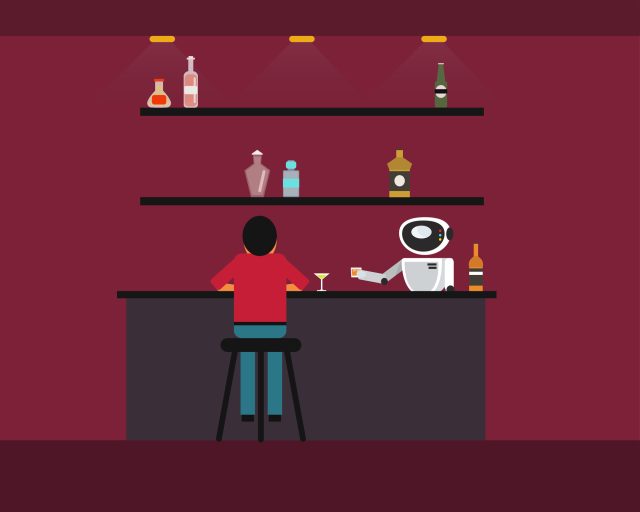This website uses cookies so that we can provide you with the best user experience possible. Cookie information is stored in your browser and performs functions such as recognising you when you return to our website and helping our team to understand which sections of the website you find most interesting and useful.
Do robot bartenders put human jobs at risk?
Robot bartenders are a tale as old as, well, robots. But with new technological advancements being made every day, do we run the risk of making ourselves obsolete behind the bar?

In the UK, with hospitality vacancies still higher than pre-pandemic levels, there may just be enough jobs to go around.
New figures from the Office for National Statistics show that there were 112,000 vacancies in hospitality at the end of 2023, down from 147,000 at the same time in 2022.
Current vacancies do, however, remain far higher than pre-Covid, when there were 89,000, and our vacancy rate in the UK is currently at 8%.
Many companies are therefore still on the hunt for (human) staff to fill these roles.
But for jobs already filled, the National Living Wage is set to increase in April, which will lead to higher costs for already struggling businesses.
Technology could help alleviate some of these pressures. Kate Nicholls, chief executive of UKHospitality, told the drinks business: “With rising costs across the board, hospitality businesses will be looking at ways they can improve efficiency, reduce cost and boost their productivity. Technology can play a part in that and, where practicable and affordable, businesses will be exploring how they can evolve their operations in this way. For example, utilising self-ordering systems and self-service kiosks in quick service venues and automated systems for simple tasks in kitchens.”
And Nicholls isn’t worried about the threat to people’s jobs.
“Our people are at the core of hospitality businesses and we do not envisage that changing in the near future,” she says. “The advanced skills required for our chefs, for example, are simply unable to be replicated by technology and automation.
“That’s why one of our core priorities as a sector is investing in, developing and growing our new and existing talent, as they will remain absolutely critical to our sector for generations to come.”
Robot bartenders and AI waiters have until now been seen as a bit of fun — a low-stakes way to put the technology into practice.
Our automaton counterparts are also an easy way to make headlines. Even celebrities like Kendall Jenner have bought in; the model, a member of the Kardashian family, hired a robot bartender to serve drinks at a launch event for her 818 Tequila brand in 2022, leading to countless news stories and videos online.
Richtech, the Nevada-based robotics company responsible for Jenner’s robot, exhibited its latest model at the 2024 Consumer Electronics Show (CES), according to business magazine Inc.
With a price tag of US$180,000, ADAM, as the robot is called, is unlikely to be stealing anyone’s jobs just yet. Richtech has managed to shift just six ADAMs in total.
However, the company has now taken to hiring out its robots, highlighting their power to change the hospitality industry even now.
ADAM robots are employed as a barista at Botbar Coffee’s two New York City locations in Times Square and Brooklyn, as well as at ClouTea, a boba tea shop found at Caesar’s Palace in Las Vegas.
Richtech intended to showcase the new capabilities in ADAM, with its egg-shaped body and claws for hands, enabling it to hold a conversation with drinkers and work more seamlessly alongside fellow staff.
The robot’s torso, which is bolted to the floor so it can swivel with full 360 degree freedom, takes just a minute to prepare a beverage.
At US$180,000 a pop, robots like ADAM are a big investment for already struggling hospitality venues to swallow. But with wages ever rising, and the technology improving day to day, robot bartenders could be a desirable asset in years to come.
Related news
UK Christmas lights could buy 14 million mulled wines
Nicolas Feuillatte welcomes new year with new UK importer
SWR: lighter bottles for entry level wines is 'the wrong message'

